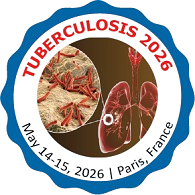Mycobacterial Infections
Tuberculosis (TB) is a chronic infectious disease caused by Mycobacterium tuberculosis, primarily affecting the lungs but sometimes spreading to other organs. Most infections remain latent without symptoms, but about 10% progress to active TB if untreated. Active TB causes symptoms such as persistent cough with blood, fever, night sweats, and weight loss. TB remains a major global health concern. Other mycobacterial diseases include leprosy and nontuberculous mycobacterial (NTM) infections. Diagnosis relies on laboratory testing, and treatment requires long-term, targeted antibiotics along with strong public health measures to prevent spread.
Related Conference of Mycobacterial Infections
April 27-28, 2026
14th International Conference on COPD Clinical Trials & Lung Care Advances
Paris, Aland Islands
May 14-15, 2026
6th International Conference on Tuberculosis, Lung Health and Respiratory Diseases
Paris, France
June 29-30, 2026
16th International Conference on Pulmonary & Respiratory Medicine
Aix-en-Provence, France
Mycobacterial Infections Conference Speakers
Recommended Sessions
- Cardiopulmonary Disease
- Chronic Obstructive Pulmonary Disease (COPD)
- Climate Change and Respiratory Diseases
- Drug-Resistant Tuberculosis:
- Early Detection and Diagnosis
- Epidemiology of TB Disease
- Gastroesophageal reflux disease (GERD)
- Infection Control Measures
- Integrated Healthcare Approach
- Latent TB Infection and Active TB Disease
- Lung Cancer: Screening, Diagnosis & Treatment
- Lung Function in Men with and without HIV
- Lung Infection
- Multidrug-resistant TB
- Mycobacterial Infections
- Nutrition and Tuberculosis
- One Health Approach to TB Control
- Palliative Care for Advanced Lung Cancer
- Pediatric Tuberculosis
- Preventive Therapy
- Pulmonary Complications of Endocrine Diseases
- Pulmonary Diseases and Therapeutics
- Pulmonary Edema
- Research and Innovation
- TB Clinical Trials
- TB Vaccines
- TB-HIV Co-Infection:
- TB-HIV Co-infections
- Tuberculosis in Vulnerable Populations
- Vaccination Programs:
Related Journals
Are you interested in
- Advances in Mechanical Ventilation and Respiratory Support - Pulmonology-2026 (Spain)
- Airway Management Techniques in Critical Care Settings - Pulmonology-2026 (Spain)
- Asthma - Pulmonary Meet 2026 (France)
- Asthma Management: Guidelines and Personalized Therapy - Pulmonology-2026 (Spain)
- Cardiopulmonary Disease - Tuberculosis-2026 (France)
- Chronic Bronchitis - Pulmonary Meet 2026 (France)
- Chronic Obstructive Pulmonary Disease (COPD) - Pulmonary Meet 2026 (France)
- Chronic Obstructive Pulmonary Disease (COPD) - Tuberculosis-2026 (France)
- Chronic Obstructive Pulmonary Disease (COPD) Updates - Pulmonology-2026 (Spain)
- Climate Change and Respiratory Diseases - Tuberculosis-2026 (France)
- Critical Care Strategies in Sepsis and Multi-Organ Failure - Pulmonology-2026 (Spain)
- Cystic Fibrosis - Pulmonary Meet 2026 (France)
- Drug-Resistant Tuberculosis: - Tuberculosis-2026 (France)
- Early Detection and Diagnosis - Tuberculosis-2026 (France)
- Epidemiology of TB Disease - Tuberculosis-2026 (France)
- Ethical Dilemmas and Decision-Making in ICU Settings - Pulmonology-2026 (Spain)
- Gastroesophageal reflux disease (GERD) - Tuberculosis-2026 (France)
- Immunotherapy and Biologics in Respiratory Diseases - Pulmonology-2026 (Spain)
- Infection Control Measures - Tuberculosis-2026 (France)
- Infectious Respiratory Diseases - Pulmonary Meet 2026 (France)
- Innovations in Interventional Pulmonology - Pulmonology-2026 (Spain)
- Integrated Healthcare Approach - Tuberculosis-2026 (France)
- Interstitial Lung Disease (ILD) - Pulmonary Meet 2026 (France)
- Latent TB Infection and Active TB Disease - Tuberculosis-2026 (France)
- Lung Cancer - Pulmonary Meet 2026 (France)
- Lung Cancer Screening, Diagnosis, and Interventions - Pulmonology-2026 (Spain)
- Lung Cancer: Screening, Diagnosis & Treatment - Tuberculosis-2026 (France)
- Lung Function in Men with and without HIV - Tuberculosis-2026 (France)
- Lung Infection - Tuberculosis-2026 (France)
- Lung Infections: Tuberculosis, Pneumonia, and Beyond - Pulmonology-2026 (Spain)
- Lung Problems - Pulmonary Meet 2026 (France)
- Lung Transplantation - Pulmonary Meet 2026 (France)
- Management of Acute Respiratory Distress Syndrome (ARDS) - Pulmonology-2026 (Spain)
- Multidrug-resistant TB - Tuberculosis-2026 (France)
- Mycobacterial Infections - Tuberculosis-2026 (France)
- Non-Invasive Ventilation in Acute and Chronic Care - Pulmonology-2026 (Spain)
- Nutrition and Tuberculosis - Tuberculosis-2026 (France)
- One Health Approach to TB Control - Tuberculosis-2026 (France)
- Palliative Care for Advanced Lung Cancer - Tuberculosis-2026 (France)
- Pediatric Pulmonology and Critical Care Challenges - Pulmonology-2026 (Spain)
- Pediatric Tuberculosis - Tuberculosis-2026 (France)
- Pleural Diseases - Pulmonary Meet 2026 (France)
- Point-of-Care Ultrasound in Critical Care Medicine - Pulmonology-2026 (Spain)
- Post-COVID Pulmonary Complications and Long-Term Care - Pulmonology-2026 (Spain)
- Prevention and Control of Respiratory Diseases - Pulmonary Meet 2026 (France)
- Preventive Therapy - Tuberculosis-2026 (France)
- Pulmonary Complications of Endocrine Diseases - Tuberculosis-2026 (France)
- Pulmonary Diseases and Therapeutics - Tuberculosis-2026 (France)
- Pulmonary Edema - Tuberculosis-2026 (France)
- Pulmonary Fibrosis and Interstitial Lung Disease - Pulmonology-2026 (Spain)
- Pulmonary Hypertension - Pulmonary Meet 2026 (France)
- Pulmonary Hypertension: Diagnosis and Emerging Therapies - Pulmonology-2026 (Spain)
- Pulmonary Rehabilitation - Pulmonary Meet 2026 (France)
- Pulmonary Rehabilitation and Patient-Centered Recovery - Pulmonology-2026 (Spain)
- Pulmonology - Pulmonary Meet 2026 (France)
- Research and Innovation - Tuberculosis-2026 (France)
- Respiratory Disorders - Pulmonary Meet 2026 (France)
- Respiratory Tract Infections - Pulmonary Meet 2026 (France)
- Role of Imaging in Pulmonary Diagnostics and ICU Care - Pulmonology-2026 (Spain)
- Sleep-Disordered Breathing and CPAP Therapies - Pulmonology-2026 (Spain)
- Sleep-Related Respiratory Disorders - Pulmonary Meet 2026 (France)
- TB Clinical Trials - Tuberculosis-2026 (France)
- TB Vaccines - Tuberculosis-2026 (France)
- TB-HIV Co-Infection: - Tuberculosis-2026 (France)
- TB-HIV Co-infections - Tuberculosis-2026 (France)
- Tuberculosis - Pulmonary Meet 2026 (France)
- Tuberculosis in Vulnerable Populations - Tuberculosis-2026 (France)
- Vaccination Programs: - Tuberculosis-2026 (France)

